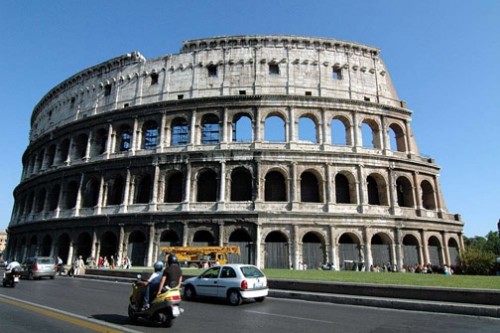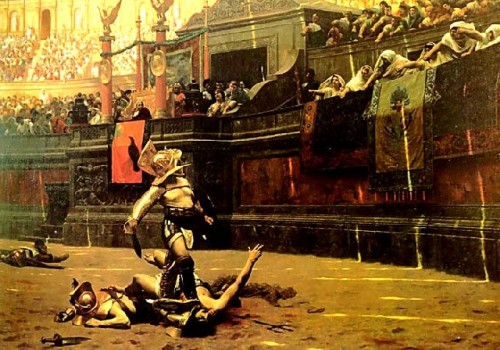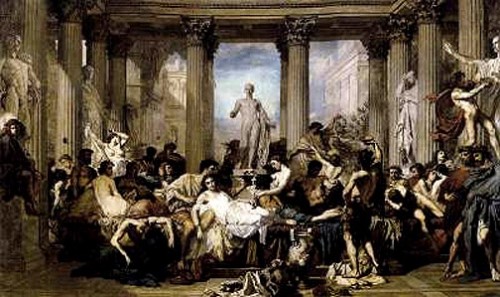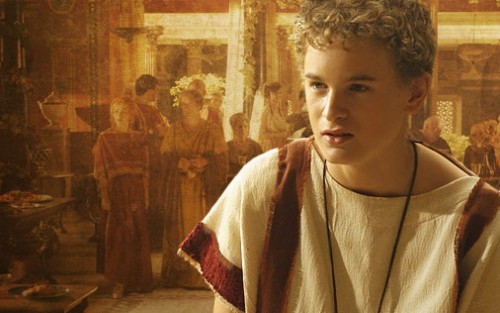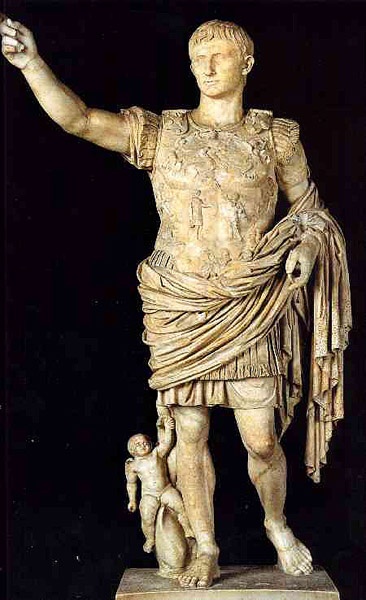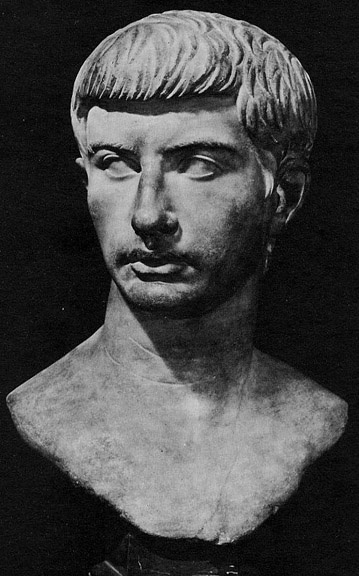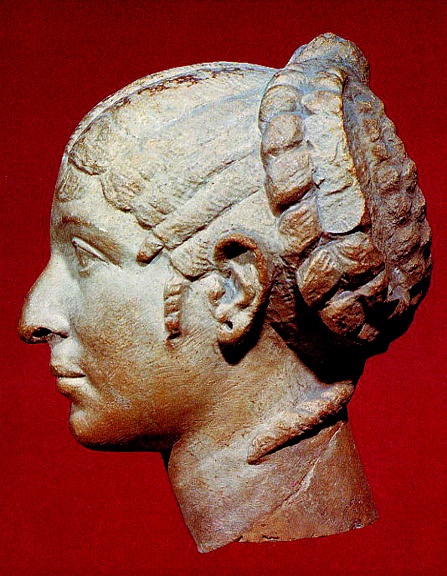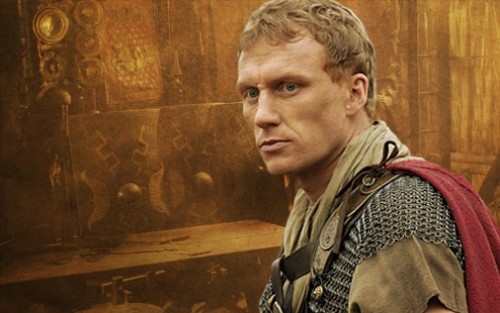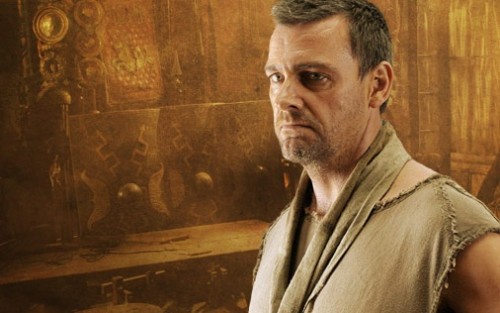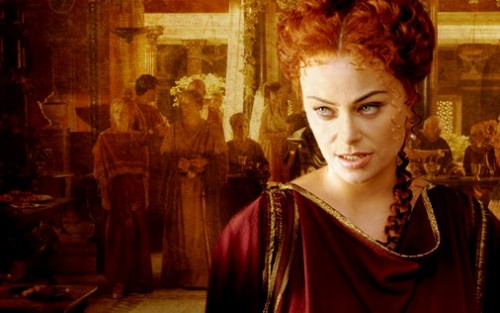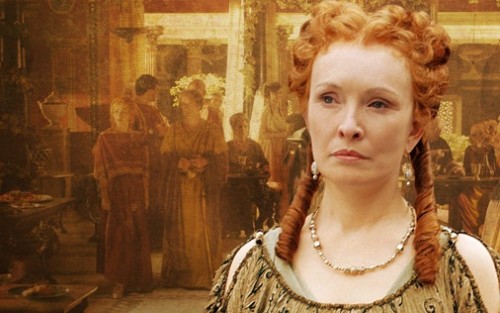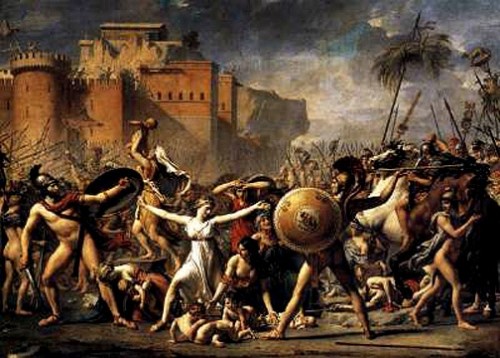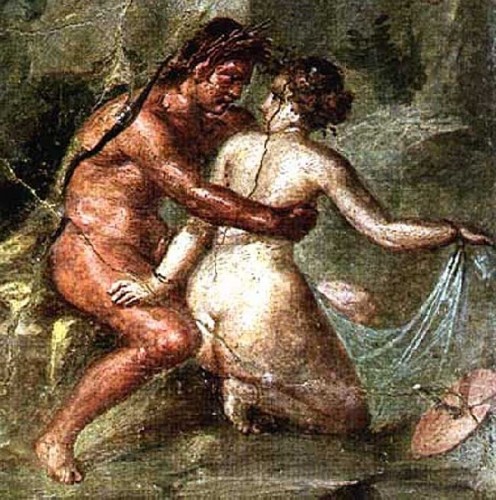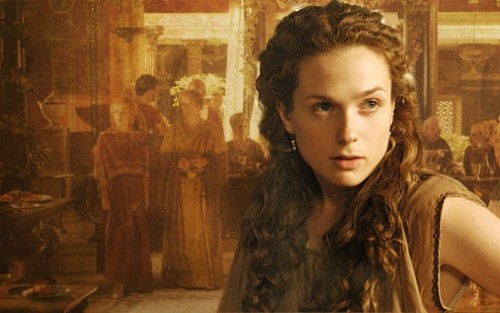All Roads Lead to HBO's Rome
Gallia est omnis divisa in partes tres
By: Charles Giuliano - Jan 13, 2007
Rome
Cast: Lucius Vorenus, Kevin McKidd, Titus Pullo, Ray Stephenson, Atia of the Julii, Polly Walker, Servilla of the Junii, Lindsay Duncan, Gaius Octavian, Max Pirkis, Marc Antony, James Purefoy, Marcus Junius Brutus, Tobias Menzies.
HBO Sunday nights, 9 PM
The Franciscan nuns at Mt. Alvernia Academy introduced me to the ancient Romans. They described these "pagans" as decadent perverts who crucified Christ and persecuted Christians by feeding them to lions in the Colosseum. They feasted for hours on end and engaged in orgies. The nuns were not very specific about orgies which only whet my appetite to know more about these terrible, but fascinating heathens.
Later the nuns called an assembly to pray for my lost soul when it was revealed that I would not be going on to Saint Sebastian's with the other rich Catholic boys but instead would enter class six of Boston Latin School. There I would get more than my fill of ancient Rome with six years of Latin beginning with Richie's "First Steps." Amo, amas, amat. By freshman year we were reading Caesar's Gallic Wars with its famous opening sentence that "Gallia est omnis divisa in partes tres." By sophomore year we labored through Cicero and in the junior year, Virgil's The Aeneid "Arma virumque cano, Troiae qui primus ab oris Italiam, fato profugus..." and from there Catullus and Ovid. All of which I have pretty much forgotten but Latin is embedded in my use of language and a fascination with words and syntax. The curriculum also included French and German although the "better boys" took Greek. Clearly I was not of their number but arguably it was the convoluted twists and turns of Cicero that, with a dash of acid in the 60s, may well have led to Gonzo journalism. However odd we may become in later life one never has enough of the classics as a foundation. Frankly, it's what's lacking in kids nowadays. Their houses are built on politically correct, self indulgent sand. No child left behind with its implication of the many thinly educated.
The Romans continue to fascinate us. It starts perhaps with the 1925 silent film "Ben Hur: A Story of the Christ" that starred Ramon Novarro in the famous chariot race that Charlton Heston would remake. Since then it has become standard Hollywood fare including an Oscar for Russell Crowe in the 2000 Ridley Scott film "Gladiator." It was particularly memorable for the suberb art direction and set design that reproduced the spectacle of the Colloseum with precise detail and authenticity. Some years back PBS presented the superb mini series "I Claudius," staring the stuttering, club footed, Claudius the fool played by Derek Jacobi, based on the novel of Robert Graves which was inspired by the accounts of Suetonius and his "Lives of the Twelve Ceasars." They were indeed some of the most remarkable creatures who ever lived and an endless resource for art and literature. Even porn producer Bob Guccione, publisher of Penthouse Magazine, took a shot at ancient Rome with the very odd "Caligula." On paper that film looks so promising with Gore Vidal's text (he was fired) and starring an amazing cast including Hellen Mirren, Sir John Gielgud, Malcolm McDowell, Peter O'Toole and others. But all to no avail. Too much porn too little Rome. Such a pity. In London we saw a wonderful production of Albert Camus's "Caligula" at the Barbicon Theatre. It presented the mad emperor, one of the most evil dictators who ever lived, as a conflicted, intelligent, complex existentialist. The thesis was a stretch but it made for riveting theatre. Similarly. we are much anticipating Jean Racine's "Britannicus" which is about to open at American Repertory Theatre in Cambridge.
On Sunday, January 14, HBO is back with its second, and alas, final season of "Rome." At a cost of $100 million it proved to be too expensive relative to the size of the audience. Like "Deadwood" it is another HBO series with a limited but fanatical fan base. Perhaps "Rome" tries too hard to be all things to all people. Yes there is history but mostly seen through the eyes of the fictional, minor characters Lucius Vorenus, Kevin McKidd, the upwardly mobile Centurion who was appointed to the Senate by Caesar before his demise in the final episode of last season, and his brutish, lovable lug, sidekick, Titus Pullo, Ken Stevenson. We mostly see the aftermath of the Civil War that followed the murder of Caesar in the Senate through their plebian eyes.
These diamonds in the rough, however, are humanistic gems compared to the smarmy evil of the patricians particularly the vain and wicked ladies Atia of the Julii, Polly Walker, and her arch rival, Servilia of the Junii, Lindsay Duncan. We are intrigued to observe the development of the smart and nasty adolescent, Gaius Octavian, Max Pirkis, who will emerge as Caesar Augustus after the defeat of the conspirators led by Marcus Junius Brutus, Tobias Menzies, followed by the decisive battle of Actium on 2 September, 31 BC against the Egyptian navy of Marc Antony, James Purefoy, and his mistress, Cleopatra. She produced a potential heir to the throne of Rome in an earlier tryst with Julius Caesar that gave birth to a son Cesarean. Julius Caesar fathered no other child and Gaius Octavian was a great nephew of Julius. So Cleopatra had a more legitimate claim for her bastard son to rule Rome which would have been the case with a better outcome of the decisive battle that cost her life and that of her lover Marc Antony. Octavian's admirals burned the Egptyian fleet which blew ashore and burned the city of Alexandria resulting in the loss of its legendary Library. Having eliminated his rivals Octavian dubbed himself Augustus, the Divine One, and decreed that he be worshiped as a god.
As we hunker down to resume "Rome" let us all too briefly revel in its marvelous decadence. There isn't much prospect of learning any history or gaining valued insights about the decline and fall of Ancient Rome. No this is just pure entertainment and great fun. It is unfortunate that this season will not include Vorenus's cheating wife Niobe, Indira Varma, one of the best played and nuanced characters, indeed the moral compass of the mini series. She commited suicide when her husband learned that she had played around in his long absence. How Gauling.
Some critics have pegged "Rome" as "The Sopranos" in togas. Yes, there is truth in that. It also gives us something to do while anticipating the all too brief curtain call of the thugs from Joisey in the "waste management business." Taking out the trash seems to be particularly profitable in the Garden State.
As an individual of Sicilian heritage the Ancient Romans have a particular fascination for me, as do the Sopranos and Mafia. Just what is it about that Latin heritage that was capable of such greatness, genius and creativity, indeed the very spine of Western Culture, and yet spawned ruthless thugs? The fascination of the Ancient Romans is that they embodied the very best and worst of us. Perhaps that is what I see and struggle with when I look in the mirror. Sic transit gloria mundi.

